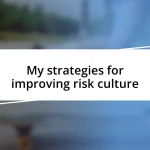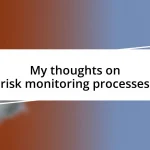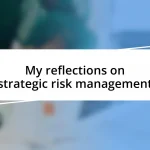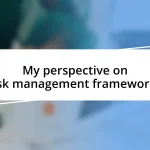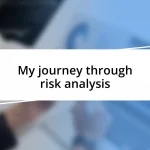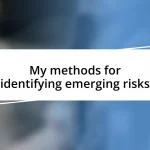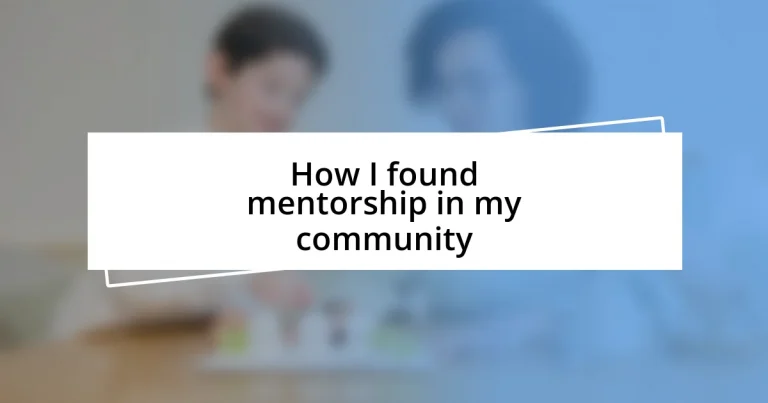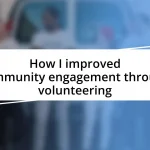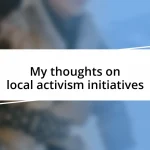Key takeaways:
- Mentorship fosters personal and professional growth, providing guidance, support, and accountability during pivotal life moments.
- Identifying local mentors involves engaging in community events, leveraging shared interests, and maintaining follow-up communication to build meaningful connections.
- Giving back to the community through volunteering and mentoring creates rewarding experiences that benefit both the mentor and the mentee, fostering a culture of learning and support.
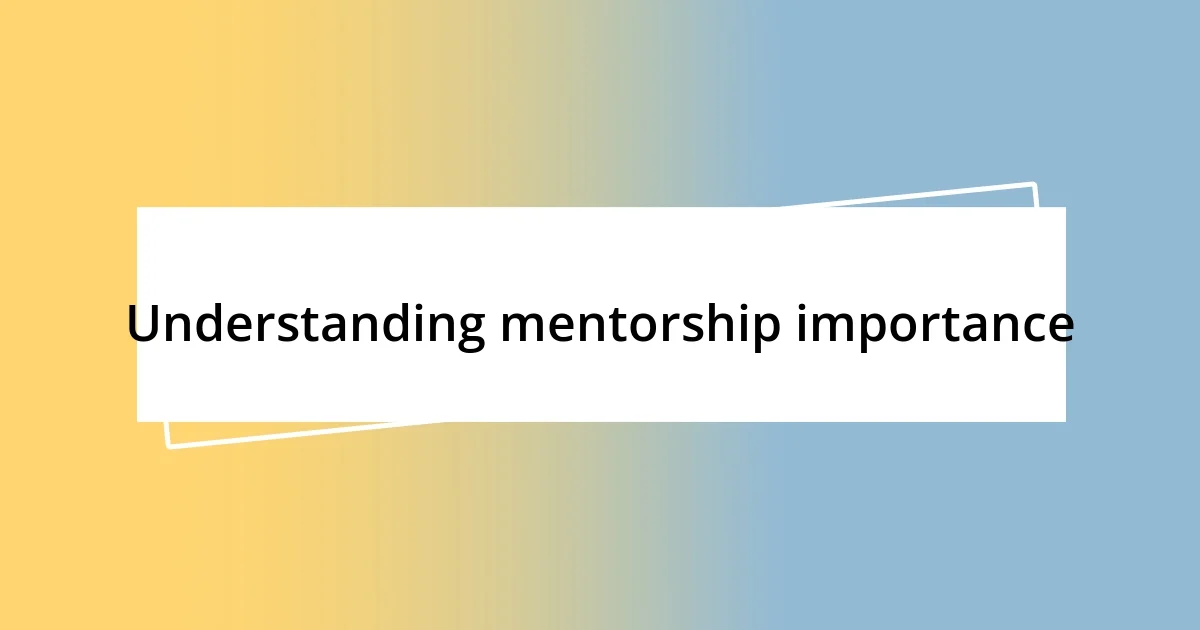
Understanding mentorship importance
Mentorship is vital because it provides guidance and support during pivotal moments in life. I recall a time when I faced a challenging career decision and turned to a mentor who had walked a similar path. Their insights not only illuminated my choices but also gave me the confidence to pursue a direction I had initially hesitated to embrace.
There’s something profoundly rewarding about having someone believe in your potential, isn’t there? Mentors offer not just advice, but also a sense of accountability. I remember my mentor’s firm belief in me when I doubted my skills in a competitive field. This relationship transformed my self-perception and drove me to push beyond my limits, showing just how crucial mentorship can be in personal and professional growth.
Have you ever thought about the ripple effect of mentorship in a community? It’s not just about individual growth; it fosters a culture of learning and support. I see how my community thrives as mentors uplift others. The bonds formed between mentor and mentee create a framework that encourages knowledge sharing, ultimately strengthening everyone involved.
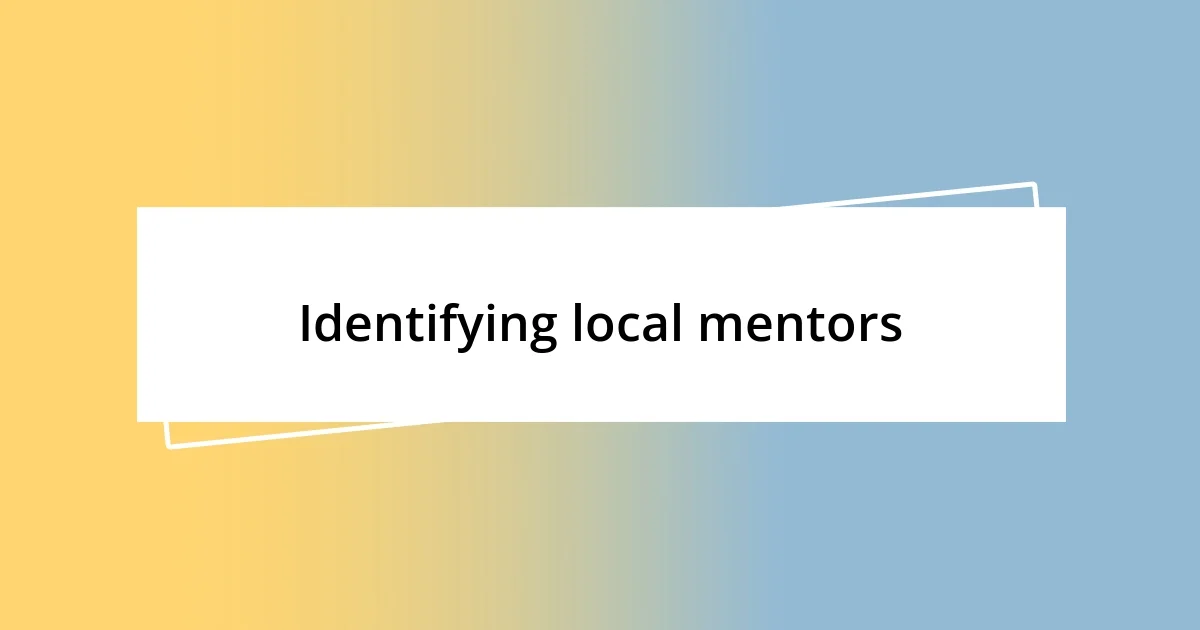
Identifying local mentors
Identifying local mentors can be an enriching process and often starts with considering the people already in your sphere of influence. Think about those you admire and respect—local business owners, educators, or community leaders. In my own experience, I found a mentor in a neighborhood nonprofit leader, someone who exuded passion for social change and was more than willing to share their journey with me. It felt like discovering a hidden gem right in my backyard.
Here are some practical ways to identify potential mentors in your community:
- Attend local events: Workshops, seminars, and community gatherings are great places to meet potential mentors who share your interests.
- Join clubs or organizations: Being part of a group can naturally introduce you to experienced individuals willing to guide others.
- Reach out through social media: Platforms like LinkedIn can be invaluable for connecting with local professionals who may not only offer advice but also become trusted mentors.
- Ask for recommendations: Don’t hesitate to ask mutual friends or colleagues about possible mentors; word-of-mouth can lead to fantastic matches.
- Volunteer: Engaging in local charities or organizations can put you in touch with seasoned individuals who genuinely care about mentorship.
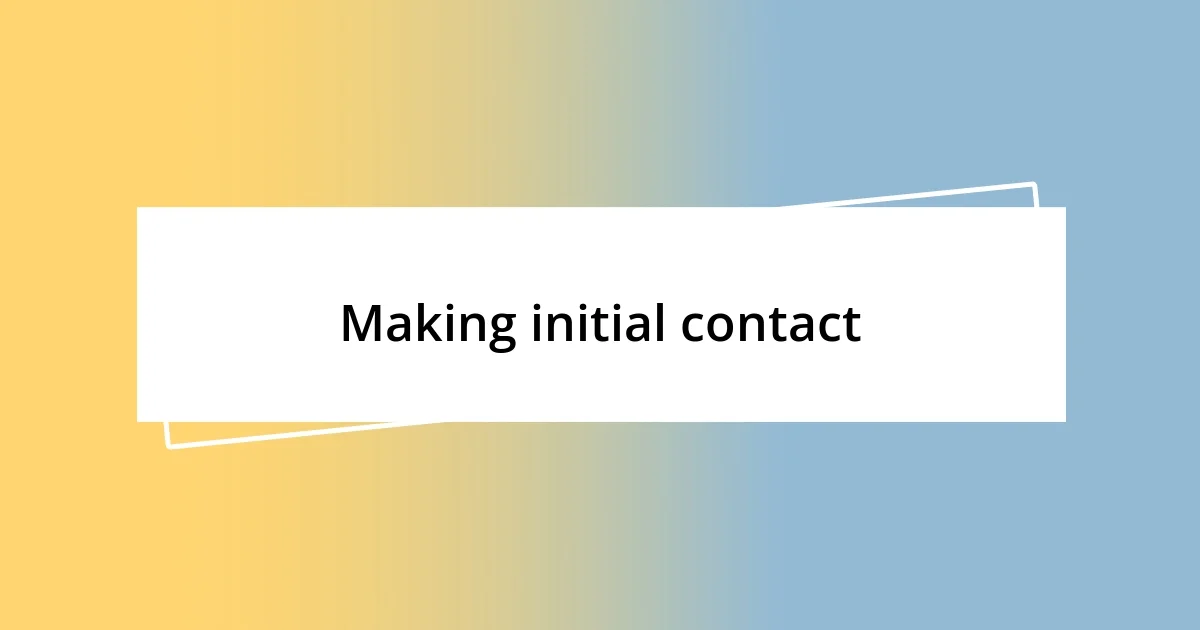
Making initial contact
Making initial contact with a potential mentor can feel daunting, but I’ve learned it doesn’t have to be. My first approach involved attending a local networking event where a speaker resonated with me deeply. Just stepping up and introducing myself, sharing my aspirations, and mentioning how I appreciated their insights opened the door for a genuine conversation. That simple interaction felt like breathing fresh air into my quest for guidance.
You might be wondering about the best ways to break the ice. One effective method is to leverage shared interests. In my case, I noticed we both shared a passion for community service and sustainability. I engaged them by expressing admiration for their recent project in the community, which helped spark an authentic dialogue. It’s these common ground conversations that lay the foundations of a meaningful mentorship.
Remember, persistence is key. After that initial meeting, I followed up with a thank-you email, reflecting on our conversation and expressing my desire to stay in touch. This act not only demonstrated my appreciation but also underscored my commitment to developing this mentorship. These steps may seem small, but they can have a profound impact on forging a robust mentor-mentee relationship.
| Method | Description |
|---|---|
| Networking Events | Attending events to meet potential mentors face-to-face can create immediate connections. |
| Shared Interests | Finding common ground through hobbies or passions makes conversations feel more personal. |
| Follow-Up | Following up with a thank-you note reinforces your interest and appreciation. |
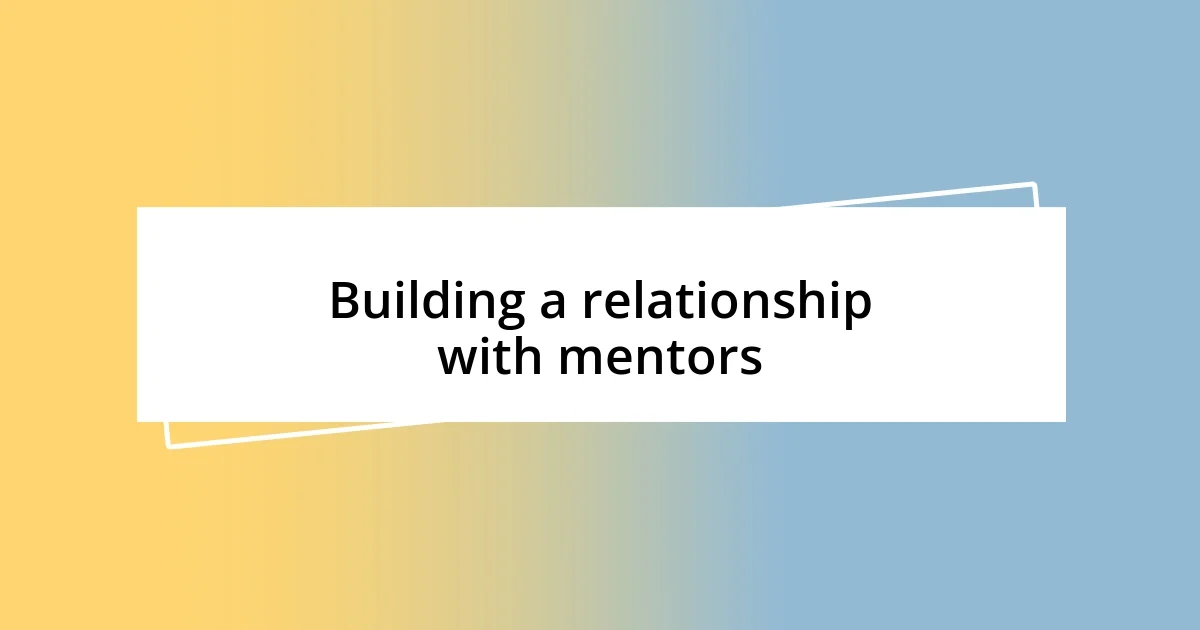
Building a relationship with mentors
Building a solid relationship with a mentor requires genuine effort and interaction. I remember how one of my mentors often suggested setting regular check-in meetings, which felt a bit awkward at first. But as I grew more comfortable, I started to look forward to these conversations, realizing they were not just transactional; they became a space for sharing ideas and personal growth.
When a mentor shares their experiences, it can be incredibly validating. I still think back to a conversation I had where my mentor opened up about their own missteps. It was this honesty that helped me feel a deeper connection to them. It’s vital to create a safe space where both you and your mentor can share victories and challenges alike. Have you ever felt that rush of relief when someone understands your struggles? That moment of vulnerability can be the cornerstone of a mentor-mentee relationship.
Moreover, I found that showing appreciation goes a long way in nurturing this bond. Whether it’s a simple thank-you note or mentioning their influence in your next social gathering, expressing gratitude reinforces the value they bring to your life. It’s a two-way street; while they may guide you, your acknowledgment of their input helps solidify that precious connection. Isn’t it rewarding to know that someone values your insights as much as you value theirs?
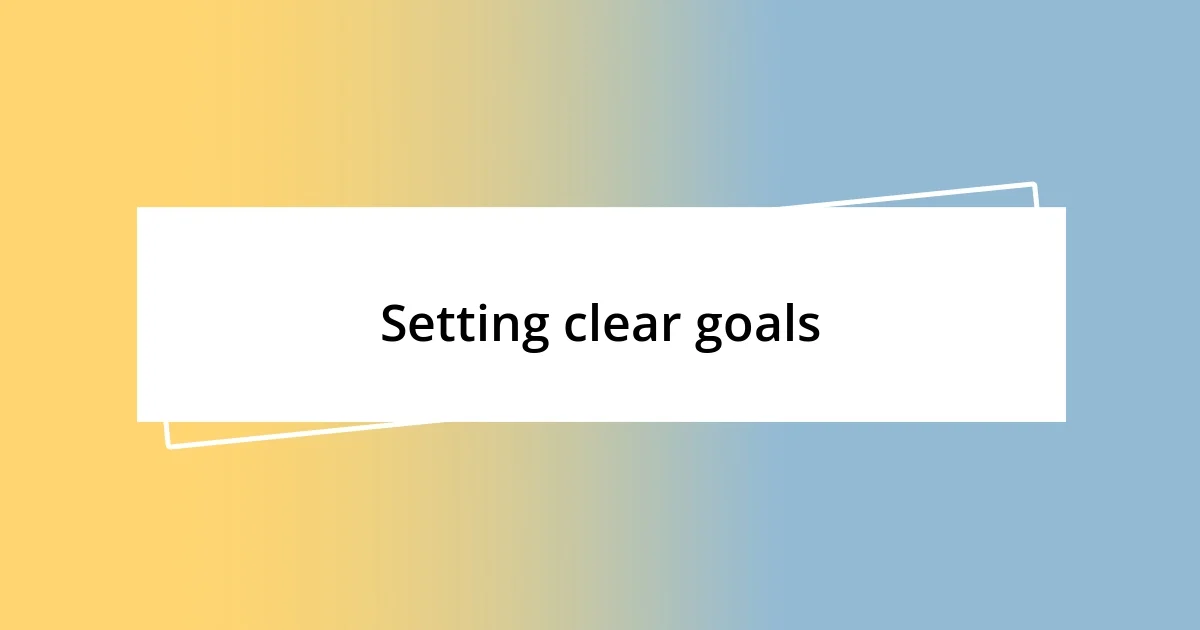
Setting clear goals
Setting clear goals is fundamental to creating a successful mentoring relationship. I remember sitting down with my notebook, thinking about what I truly wanted to achieve. It helped me articulate my goals, whether it was developing specific skills or expanding my network within my community. What I found crucial was ensuring that these goals were not just vague ideas but actionable objectives. Writing them down made them feel real, almost like a roadmap.
Have you ever tried to navigate without a clear destination? It can be disorienting, right? I learned that having well-defined milestones not only keeps me on track but also allows my mentor to provide more tailored guidance. For instance, instead of stating, “I want to improve my leadership skills,” I articulated, “I want to lead a community project within six months.” This specificity turned discussions into strategic planning sessions, which felt empowering.
Moreover, revisiting these goals regularly was a game changer for me. I recall reflecting with my mentor on my progress, which deepened our conversations. We adjusted my goals as needed, keeping the momentum harnessed and focused. Does this resonate with you? Setting and reviewing goals can transform how you interact with a mentor, shaping the relationship into one that’s dynamic and purpose-driven.
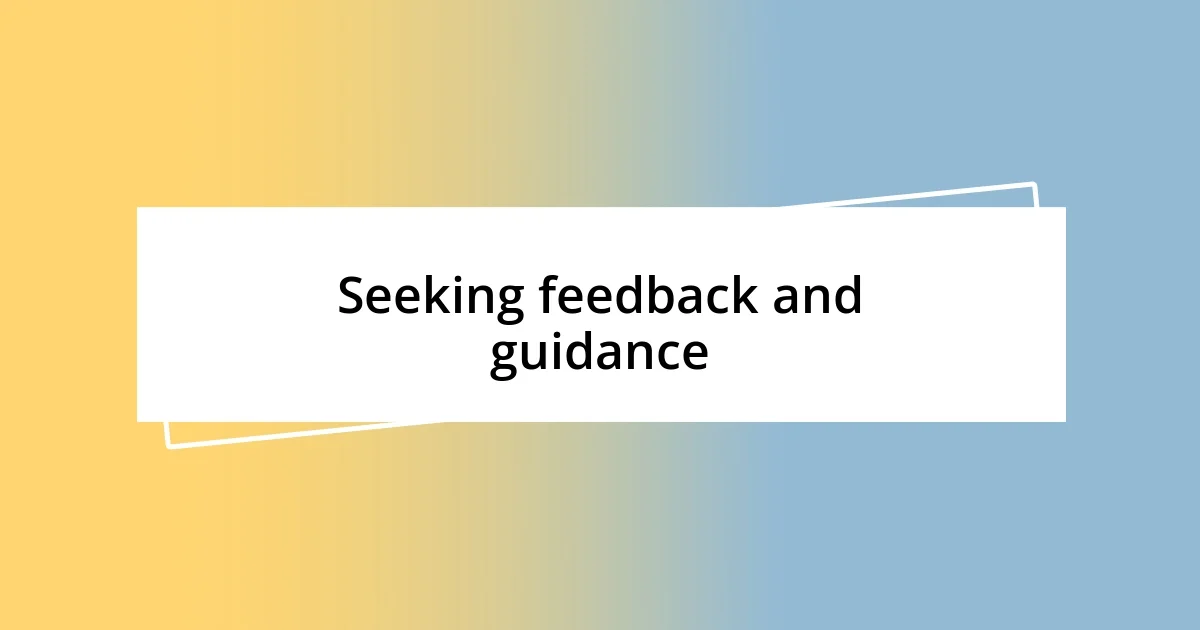
Seeking feedback and guidance
Seeking feedback and guidance can be one of the most enlightening aspects of a mentorship experience. I’ll never forget the first time I turned to my mentor for feedback after completing a project. I felt vulnerable laying out my work, wondering if I had done enough. But their constructive criticism opened my eyes to areas I had overlooked, transforming my perspective on what it meant to genuinely seek improvement.
In my journey, I discovered that asking specific questions enhances the feedback process. Instead of just asking, “What did you think?” I learned to frame my inquiries around particular aspects, like, “How effective do you think my presentation style was?” This not only steered the conversation in a more productive direction but also made me feel more in control of my learning. Have you experienced that deeper clarity when you drill down into specifics? It’s a liberating feeling to receive feedback that is both relevant and actionable.
I also remember the initial reluctance I felt in voicing my needs for guidance. But then it dawned on me—mentorship thrives on open communication. One day, I decided to candidly express my uncertainties regarding a career decision. The relief I felt when my mentor responded with understanding and practical suggestions was transformative. This exchange taught me that the more I articulate my needs, the richer the mentorship experience becomes, creating a partnership based on trust and shared growth.
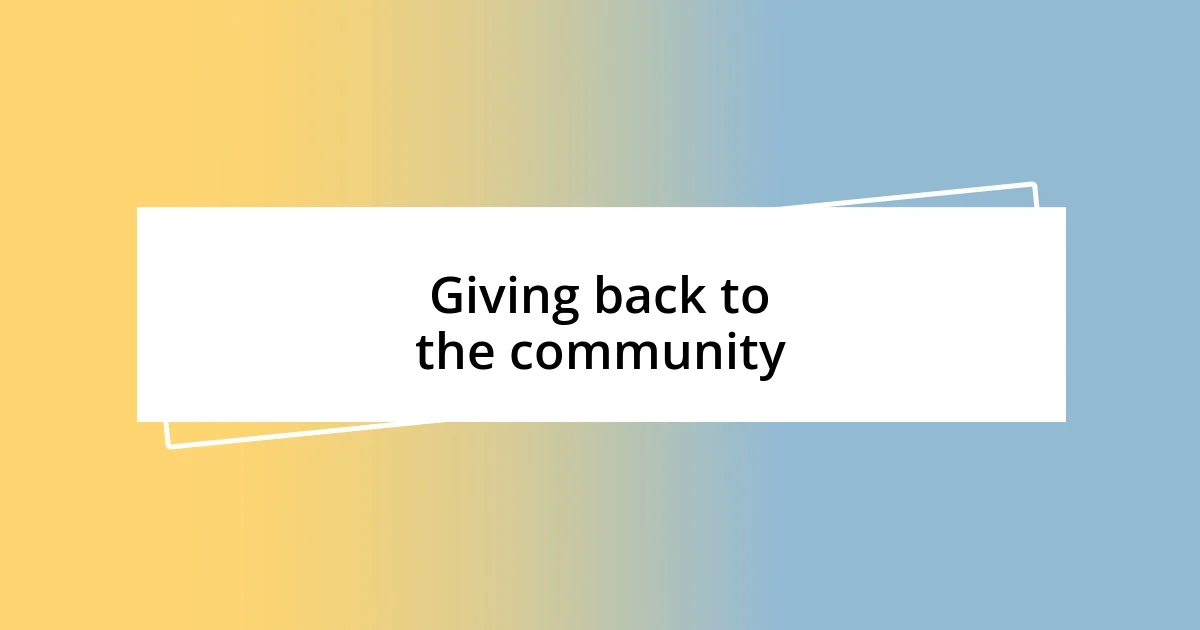
Giving back to the community
Volunteering in community projects is one of the most rewarding ways to give back. I remember my first experience with a local cleanup initiative. It was a sunny Saturday morning, and I felt a rush of excitement mingled with apprehension as I gathered with others who shared a passion for our neighborhood. That day, I not only helped beautify our surroundings but made connections that would evolve into mentorship opportunities. Have you ever participated in something that sparked unexpected relationships? That sense of camaraderie truly deepened my commitment to supporting others in our community.
Finding ways to uplift those around us can be incredibly fulfilling. I was fortunate enough to mentor a young student through a local after-school program, and it changed my perspective on giving back. Each session, I witnessed their growth, whether they improved their grades or gained more confidence in their abilities. It was inspiring to see how my experience could make such a difference in someone else’s life. Have you thought about how your unique skills could help others? Embracing this role reminded me that mentorship is a two-way street, where both the mentor and mentee benefit.
Furthermore, the joy of giving back is often magnified by the diverse experiences we share within our communities. I once organized a workshop that brought together people from various backgrounds, each with their own stories and insights. The energy in the room was contagious, as we pooled our knowledge to tackle common challenges. Sharing our different perspectives opened my eyes to new possibilities for collaboration. Isn’t it fascinating how community engagement can lead to learning opportunities for everyone involved? It felt like a beautiful reminder that we grow stronger together, reinforcing the idea that giving back enriches not only those we help but ourselves as well.



